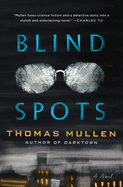
How a pandemic changes the world's culture and individuals--something all readers have experienced during the past couple of years--infuses Blind Spots, Thomas Mullen's fascinating piece of speculative fiction. Mullen's seventh novel centers on a global epidemic. It finally eases up after seven years, during which time everyone in the world was blinded in the span of a few months. "The Blinding" eroded trust among everyone, created chaos as people scrambled for food and resources, and made policing almost impossible. Then technology caught up to the catastrophe with vidders, small metal discs implanted in most people to send visual data to their brains. Vidders make police work more manageable, but homicide detective Mark Owens's latest case perplexes him and his team, who patrol an unnamed American city. A shooter--who found a way to be invisible to the only witness's vidder--murders research scientist Ray Jensen. Mark doubts the witness's account until a similar murder happens in front of him. Any technology can be hacked, but this has dire consequences for mankind.
Blind Spots illustrates the major dilemmas of society and the minute details of daily life that arise when the world is blind. Without sight, the other senses increase--but not always for the better. The vidders allow data to come straight to one's brain but also give the government access to thoughts and actions as people trade privacy for sight. Mullen (Darktown; The Revisionists) creates a complete world in crisis, superbly mixing a solid police procedural with a bleak futuristic novel that is frighteningly realistic. --Oline H. Cogdill, freelance reviewer

